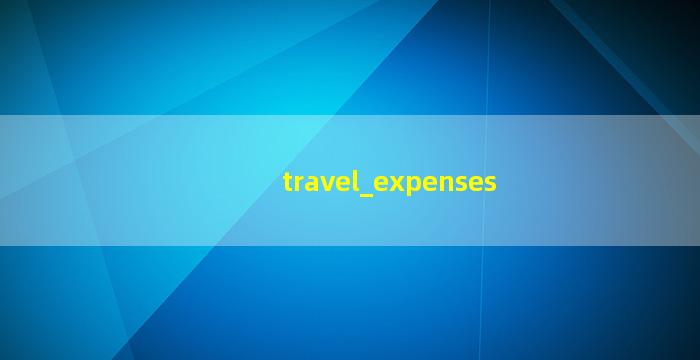旅行费用英文怎么写(旅行费用用英语怎么说)
1、旅行费用英文怎么写
Travel expenses in English
Traveling is a passion for many people around the world. Exploring new destinations, experiencing different cultures, and creating lifelong memories are all part of the adventure. However, when planning a trip, one important aspect that needs to be considered is the travel expenses.

To start with, transportation costs play a significant role in the overall travel expenses. Whether it's airfare, train tickets, or fuel for a road trip, getting from one place to another can sometimes be costly. It is essential to allocate a portion of the budget for transportation to ensure a smooth journey.
Accommodation expenses are another crucial factor when planning a trip. Hotels, hostels, or rental homes all come with a price tag. The cost of accommodation often varies depending on the location, amenities, and season. It is advisable to research and compare different options to find the best deal that suits your budget.
Food and dining costs should also be taken into account. Trying local cuisines and indulging in culinary delights is one of the highlights of any trip. However, dining out can add up quickly, especially in popular tourist destinations. Setting a daily budget for meals and exploring local street food can help manage expenses while enjoying delicious meals.
Excursions and activities are an essential part of travel experiences. It could be visiting historical sites, going on a safari, or enjoying water sports. However, these additional activities usually come with a price. It is crucial to research and prioritize the excursions that are most important to you and allocate a portion of your budget accordingly.
Lastly, miscellaneous expenses should also be anticipated. This category includes expenses such as travel insurance, visa fees, tips, and souvenirs. While these may seem small individually, they can add up quickly and impact the overall budget. It is advisable to plan ahead and allocate a portion of the budget for these miscellaneous expenses.
In conclusion, travel expenses encompass various elements that need to be carefully considered when planning a trip. From transportation and accommodation to dining and activities, it is crucial to budget and allocate funds properly. By doing so, you can enjoy your trip without any financial worries and make the most of your travel adventures.
2、旅行费用用英语怎么说
How to say "travel expenses" in English
Traveling is a great way to explore new places, experience different cultures, and create unforgettable memories. However, one aspect that can't be ignored while planning a trip is the cost involved. In English, the term "travel expenses" is commonly used to refer to the money spent on transportation, accommodation, meals, and other related costs during a journey.

When it comes to travel expenses, it is essential to set a budget and find ways to manage your finances wisely. Here are a few key phrases and vocabulary related to travel expenses:
1. Transportation costs: This includes airfare, train tickets, bus fares, and any other transport expenses incurred during the trip.
2. Accommodation expenses: This includes the cost of staying in hotels, hostels, vacation rentals, or other types of lodging.
3. Meal costs: This refers to the amount of money spent on food and beverages while traveling. It can include eating out at restaurants or buying groceries and cooking your meals.
4. Attraction fees: Many tourist attractions or activities may require an entrance fee or ticket purchase. These fees should be factored into your travel expenses.
5. Miscellaneous expenses: This includes any other costs that may arise during your trip, such as shopping, souvenirs, travel insurance, or visa fees.
To ensure a smooth and stress-free travel experience, it is recommended to plan ahead and research the estimated costs of the destinations you plan to visit. This will help you create a realistic budget and make informed decisions regarding your travel expenses.
Remember, it's always a good idea to have some extra funds set aside for unexpected expenses or emergencies that may arise during your trip. By keeping track of your expenses and sticking to your budget, you can make the most out of your travel experience without breaking the bank.
In conclusion, travel expenses refer to the various costs involved in a trip, including transportation, accommodation, meals, attraction fees, and other miscellaneous expenses. By understanding and managing your travel expenses effectively, you can enjoy your journey while staying within your budget.

3、旅行的费用英文怎么说
Travel Expenses in English
Traveling is a wonderful way to explore new places, experience different cultures, and broaden our horizons. However, one crucial aspect that needs to be taken into consideration before embarking on a journey is the travel expenses. Let's learn how to talk about travel expenses in English!
When discussing travel expenses, here are some useful phrases and vocabulary to know:
1. Transportation Costs: This includes airfare, train or bus tickets, taxi fares, and any other transportation expenses. For example, "The cost of a round-trip flight to Paris is $800."
2. Accommodation Expenses: This refers to the cost of staying in hotels, hostels, or rented accommodations. You could say, "The average nightly rate for a hotel room in London is $150."
3. Food and Dining Costs: This covers the money spent on meals, drinks, and dining out. For instance, "We estimate that we'll spend around $50 per day on food during our trip."
4. Sightseeing and Activities: These are the expenses related to entrance fees for tourist attractions, guided tours, activities, and entertainment. You might say, "The admission fee to the museum is $15 per person."
5. Miscellaneous Expenses: This category includes expenses like travel insurance, visa fees, souvenirs, and any other unexpected costs. For example, "We should set aside some money for miscellaneous expenses such as souvenirs and gifts."
It is important to create a budget before setting off on a trip to ensure that you have enough funds to cover all your travel expenses. By estimating the costs for transportation, accommodation, food, activities, and miscellaneous expenses, you can have a clear idea of how much money you need.
Remember, traveling doesn't have to be extravagant or expensive. There are many ways to save money while traveling, such as opting for budget accommodations, eating at local restaurants, and taking advantage of free or low-cost activities.
In conclusion, understanding and planning for travel expenses in advance is essential for a successful and enjoyable trip. By being aware of the different categories of expenses and finding ways to save money, you can have a memorable travel experience without breaking the bank.


.jpg)
.jpg)
.jpg)
.jpg)
.jpg)
.jpg)